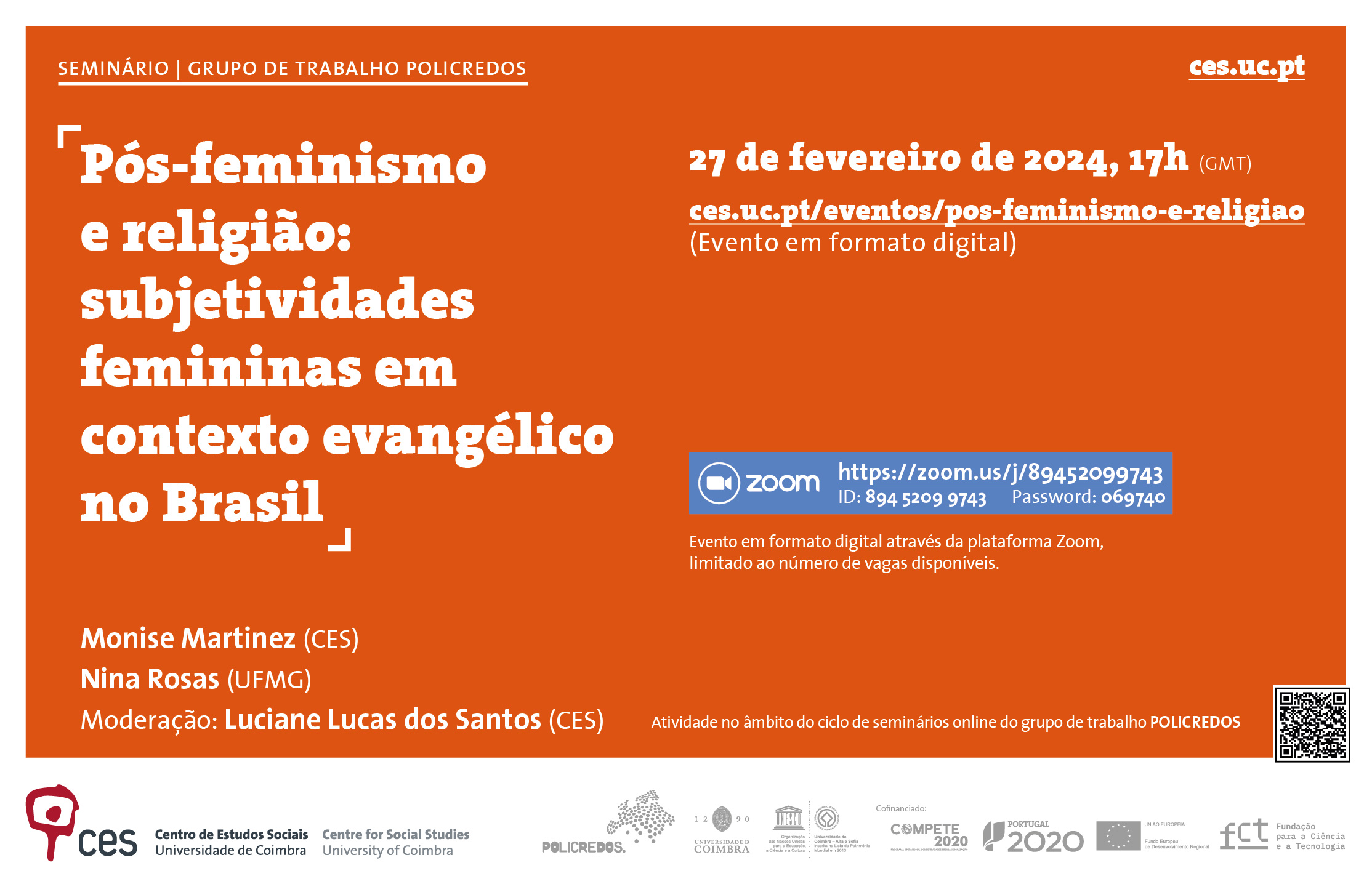Seminário | GRUPO DE TRABALHO POLICREDOS
Pós-feminismo e religião: subjetividades femininas em contexto evangélico no Brasil
Monise Martinez
Nina Rosas
27 de fevereiro de 2024, 17h00
Evento em formato digital
Moderadora: Luciane Lucas dos Santos (CES)
Enquadramento
Nas últimas décadas, teóricas feministas dedicadas aos estudos sobre o pós-feminismo vêm enfatizando a materialização deste fenômeno em discursos constituídos nos entrelaçamentos das ideologias neoliberal, neoconservadora e antifeminista. Embora tenham grande circulação e visibilidade na esfera pública midiatizada, as intersecções entre os discursos pós-feministas, as subjetividades e a agência de mulheres em contextos religiosos ainda são pouco exploradas. Compreendendo esta discussão como importante para os atuais debates sobre as fronteiras entre o religioso e o secular, este webinar abordará tais intersecções tendo como foco o contexto evangélico brasileiro. Para tanto, lançaremos luz às ambivalentes práticas de mulheres evangélicas em posição de autoridade e visibilidade, como Ana Paula Valadão (Igreja Batista de Lagoinha) e Cristiane Cardoso (Igreja Universal do Reino de Deus), explorando as formas com que entrelaçam elementos da gramática pós-feminista e da cosmovisão pentecostal na constituição de modelos idealizados de subjetividade feminina cristã. A partir dessas reflexões, discutiremos este modelo como um dispositivo social para a transgressão e/ou manutenção do status quo patriarcal, explorando os seus sentidos e possíveis usos políticos em tempos neoconservadores.
Notas biográficas
Nina Rosas é professora adjunta do Departamento de Sociologia da Universidade Federal de Minas Gerais (UFMG) e é coordenadora do Programa de Pós-graduação em Sociologia, da mesma Universidade. Mestre e doutora em Sociologia, realizou estágio de doutorado no Center for Religion and Civic Culture, em Los Angeles, com bolsa Capes. Atualmente coordena o projeto "As vivências de evangélicos portadores de adoecimento crônico", financiado pela FAPEMIG, e conduz a pesquisa "Religião, gênero e feminismo: um balanço a partir dos estudos sobre as mulheres evangélicas", fruto de bolsa de produtividade junto ao CNPq. É autora dos livros: Mulher, pra que religião? Uma crítica aos conselhos conservadores da pastora Ana Paula Valadão (KDP, 2020); e As obras sociais da Igreja Universal: uma análise sociológica (Fino Traço, 2014). Tem interesse e publica sobre os seguintes temas: religião, evangélicos, gênero, sexualidade, feminismo, política, corpo e saúde.
Monise Martinez é pesquisadora pós-doc no Centro de Estudos Sociais da Universidade de Coimbra, para além de editora, revisora e produtora de conteúdo para livros e materiais didáticos. É doutora em Estudos Feministas (UC), mestre em Estudos Editoriais (UA) e bacharela em Letras (USP), tendo realizado estágios na Universidad de Sevilla, na Università Degli Studi di Bergamo e no Núcleo de Estudos de Gênero – PAGU (Unicamp) — esses dois últimos, respectivamente, com financiamentos Erasmus+ e FCT. Martinez integra a equipe do Grupo de Trabalhos: Policredos: Religiões e Sociedade (CES) e o Grupo de Trabalho Género e Sexualidade da SOPCOM; foi membra da equipe organizadora do Gender Workshop Series (CES); trabalhou como pesquisadora bolsista no projeto “Engender: Integração dos Estudos de Género nos curricula e práticas pedagógicas no ensino público universitário em Portugal”, financiado pela FCT; e foi colaboradora no “6th Global Media Monitoring Project (GMMP) – Brasil”. Trabalha nas intersecções sobre os seguintes temas: religião, mulheres evangélicas, mídia, política, feminismos e antifeminismos.
______________
Esta atividade realiza-se através da plataforma Zoom, sem inscrição obrigatória. No entanto, está limitada ao número de vagas disponíveis > https://zoom.us/j/89452099743 | ID: 894 5209 9743 | Senha: 069740
Agradecemos que todas/os as/os participantes mantenham o microfone silenciado até ao momento do debate. A/O anfitriã/ão da sessão reserva-se o direito de expulsão da/o participante que não respeite as normas da sala.
As atividades abertas dinamizadas em formato digital, como esta, não conferem declaração de participação uma vez que tal documento apenas será facultado em eventos que prevejam registo prévio e acesso controlado.


